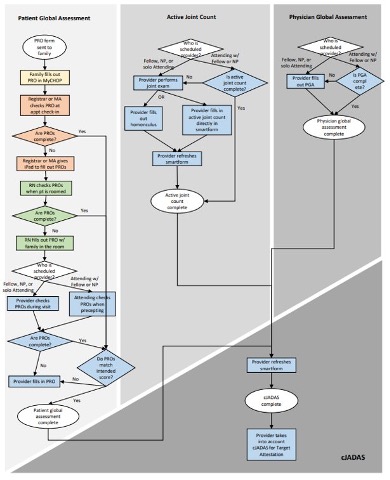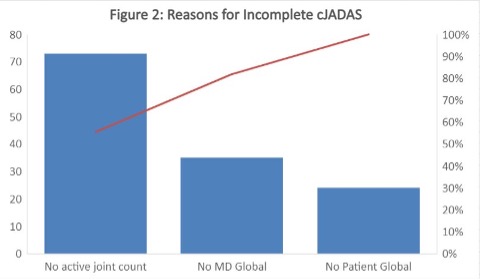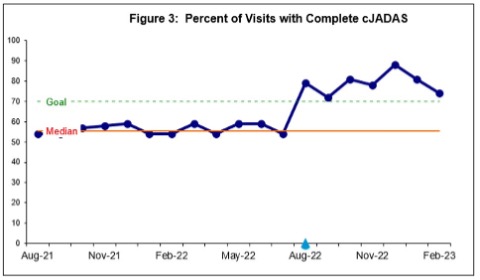Session Information
Date: Monday, November 13, 2023
Title: (1082–1099) Measures & Measurement of Healthcare Quality Poster I
Session Type: Poster Session B
Session Time: 9:00AM-11:00AM
Background/Purpose: Juvenile idiopathic arthritis (JIA) is a chronic autoimmune disease that can result in long-term joint damage if inadequately treated. Collecting validated outcomes data at the point of care can facilitate a “Treat to Target” approach and allow for pre-visit planning and population management. The clinical Juvenile Arthritis Disease Activity Score (cJADAS) is a validated outcome measure that helps rheumatologists assess disease activity. It is a score that is calculated based on three inputs: provider global assessment of disease activity, patient/parent global assessment of wellbeing, and active joint count. We identified a baseline cJADAS completion rate of only 55% in our practice. Our goal was to increase the proportion of JIA visits with cJADAS completion from 55% to 70% by February 2023.
Methods: Through process mapping (Figure 1) and a Pareto analysis (Figure 2),we found that provider cJADAS components were the most common contributor to incomplete scores. Several technical elements within the electronic health record (EHR) were also noted to be limiting cJADAS completion. Through discussions with key divisional stakeholders, we identified methods to engage clinicians in the project, including education, data distribution (monthly reports), inclusion of cJADAS completion as ongoing professional practice evaluation metric, and incorporating the metric in providers’ yearly incentive. Our process measure was the proportion of clinic visits with a visit-specific diagnostic code for JIA in which documentation of a cJADAS was completed.
Results: Beginning in September2022, we began educational interventions to promote cJADAS completion. The education included technical components required to complete the scores. Additionally, providers were informed that these outcome measures are critical for ongoing high-quality care and assessment of health disparities. Providers began receiving reports on monthly performance and were allowed to backfill cJADAS scores based on existing documentation. We noted a significant shift in the cJADAS metric beginning in August 2022 from a median of 56% to 79% that has been sustained through February 2023 (Figure 3).
Conclusion: Utilization of multiple change management techniques led to a rapid increase in completion of the cJADASin our patients with JIA. Moving forward, we will continue to monitor the rate of cJADAS completion to assess the sustainability of these changes. We plan to operationalize the scheduling workflow to ensure that patients with elevated cJADAS values remain engaged in rheumatology care and hope that this may help mitigate health disparities.
To cite this abstract in AMA style:
Costello A, Carol H, Abel D, Bayefsky S, Capponi S, Mayer A, Rood J, Spichiger K, Madas J, Cecere L, Roman M, Rutstein B, Burnham J. Improving JIA Outcomes Assessments in a Large Pediatric Rheumatology Practice: A Fellow Quality Improvement Project [abstract]. Arthritis Rheumatol. 2023; 75 (suppl 9). https://acrabstracts.org/abstract/improving-jia-outcomes-assessments-in-a-large-pediatric-rheumatology-practice-a-fellow-quality-improvement-project/. Accessed .« Back to ACR Convergence 2023
ACR Meeting Abstracts - https://acrabstracts.org/abstract/improving-jia-outcomes-assessments-in-a-large-pediatric-rheumatology-practice-a-fellow-quality-improvement-project/



